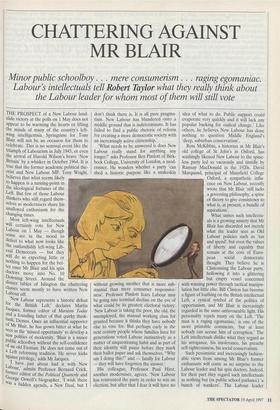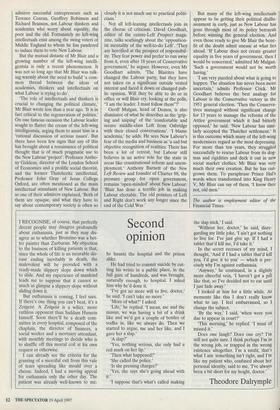CHATTERING AGAINST MR BLAIR
Minor public schoolboy . . . mere consumerism . . . raging egomaniac.
Labour's intellectuals tell Robert Taylor what they really think about
the Labour leader for whom most of them will still vote
Most left-wing intellectuals will certainly vote for New Labour on 1 May — though some are in the mood to defect to what now looks like the outlandishly left-wing Lib- eral Democrats — but they will do so expecting little or nothing to happen for the bet- ter once Mr Blair and his spin doctors move into No. 10 Downing Street. Around the dinner tables of Islington the chattering classes seem mostly to have written New Labour off.
New Labour represents a historic defeat for the British Left,' declares Martin Jacques, former editor of Marxism Today and a founding father of that quirky think- tank Demos. Once an influential supporter of Mr Blair, he has grown bitter at what he sees as the 'missed opportunity' to develop a new .politics of modernity. 'Blair is a minor public schoolboy without the self-confidence of an old Etonian. He does not come out of a Left reforming tradition. He never kicks against privilege,' adds Mr Jacques. I have just about had it with New Labour,' admits Professor Bernard Crick, former editor of the Political Quarterly and George Orwell's biographer. 'I wish there was a hidden agenda, a New Deal, but I don't think there is. It is all pure pragma- tism. New Labour has blundered onto a middle ground that is indeterminate. It has failed to find a public rhetoric of reform for creating a more democratic society with an increasingly active citizenship.' `What needs to be answered is does New Labour really stand for anything any longer?' asks Professor Ben Pimlott of Birk- beck College, University of London, a mod- erniser. He wonders whether a party 'can shed a historic purpose like a snakeskin without growing another that is more sub- stantial than mere consumer responsive- ness'. Professor Pimlott fears Labour may be going into terminal decline on the eve of what could be its greatest electoral victory: `New Labour is taking the poor, the old, the unemployed, the manual working class for granted because it thinks they have nobody else to vote for. But perhaps early in the next century people whose families have for generations voted Labour instinctively as a matter of unquestioning habit and as part of their identity will pause before they mark their ballot paper and ask themselves, "Why am I doing this?" and — fatally for Labour — they will have forgotten the answer.'
His colleague, Professor Paul Hirst, another moderniser, agrees. 'New Labour has reinvented the party in order to win an election, but after that I fear it will have no idea of what to do. Public support could evaporate very quickly and it will lack any popular backing for radical change.' Like others, he believes New Labour has done nothing to question Middle England's `deep, suburban conservatism'.
Such pessimistic and increasingly fashion- able views from among Mr Blair's former enthusiasts will come as no surprise to the Labour leader and his spin doctors. Indeed, for their part they regard such intellectuals as nothing but (in public school parlance) 'a bunch of wankers'. The Labour leader admires successful entrepreneurs such as Terence Conran, Geoffrey Robinson and Richard Branson, not Labour thinkers and academics who worry about equality, the poor and the old. Fortunately no left-wing intellectuals exist among the swing voters of Middle England to whom he has pandered to induce them to vote New Labour.
But the mutual distaste of Mr Blair and a growing number of the left-wing intelli- gentsia is only a recent phenomenon. It was not so long ago that Mr Blair was talk- ing warmly about the need to build `a com- mon thread between the ideas of academics, thinkers and intellectuals on what Labour is trying to do'.
`The role of intellectuals and thinkers is crucial to changing the political climate,' Mr Blair wrote less than a year ago. 'It is in fact critical to the regeneration of politics.' On one famous occasion the Labour leader sought to flatter the cream of the left-wing intelligentsia, urging them to assist him in a `rational discussion of serious issues'. But there have been few signs that any of this has brought about a renaissance of political thought that is of much pragmatic use to the New Labour 'project'. Professor Antho- ny Giddens, director of the London School of Economics and a prolific social theorist, and the former Thatcherite intellectual, Professor John Gray of Jesus College Oxford, are often mentioned as the main intellectual stimulants of New Labour. But as one of their admirers explained, 'Both of them are opaque, and what they have to say about contemporary society is often so cloudy it is not much use to practical politi- cians.'
Not all left-leaning intellectuals join in the chorus of criticism. David Goodhart, editor of the centre-Left Prospect maga- zine, talks scathingly about the 'opposition- ist mentality of the well-to-do Left'. 'They are horrified at the prospect of responsibil- ity. They fear power and prefer to run away from it, even after 18 years of Conservative government,' he argues. However, even Mr Goodhart admits, 'The Blairites have changed the Labour party, but they have not taken on a significant outside vested interest and faced it down or changed pub- lic opinion. Will they be able to do so in office or will Blair cry, looking at the polls, "I am the leader. I must follow them"?'
Geoff Mulgan, head of Demos, is also dismissive of what he describes as the 'grip- ing and sniping' of the 'comfortable and secure middle-class Left from Oxbridge with their closed conversations'. 'I blame academia,' he adds. He sees New Labour's fear of the media and business as 'a sad but objective recognition of realities. There has been a lot of retreat, but Labour still believes in an active role for the state in areas like constitutional reform and unem- ployment.' Anthony Barnett of the New Left Review and founder of Charter 88, the pressure group for open government, remains 'open-minded' about New Labour: `Blair has done a terrific job in making Labour electable. The old pointers of Left and Right don't work any longer since the end of the Cold War.' But many of the left-wing intellectuals appear to be getting their political disillu- sionment in early, just as New Labour has gone through most of its policy betrayals before winning the general election. And even those ready to give Mr Blair the bene- fit of the doubt admit unease at what lies ahead. 'If Labour does not create greater equality in five years of government, then I would be concerned,' admitted Mr Mulgan. `Such a government would not be worth having.'
`I am very puzzled about what is going to happen. The situation has never been more uncertain,' admits Professor Crick. Mr Goodhart believes the best analogy for Labour is the Conservative victory in the 1951 general election. 'Then the Conserva- tives managed without significant change for 13 years to manage the reforms of the Attlee government which it had bitterly opposed,' he said. 'New Labour has simi- larly accepted the Thatcher settlement.' It is this outcome which many of the left-wing modernisers regard as the most depressing. For more than ten years, they struggled successfully to rescue Labour from its dog- mas and rigidities and deck it out in new social market clothes. Mr Blair was very much their own creation. But he has out- grown them. To paraphrase Prince Hal's words when transformed into King Henry V, Mr Blair can say of them, 'I know thee not, old men.'
The author is employment editor of the Financial Times.



































































 Previous page
Previous page